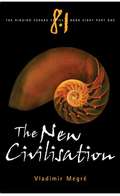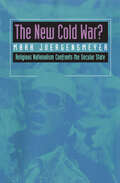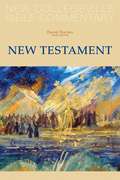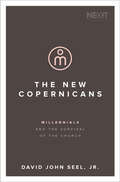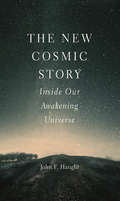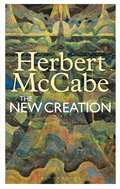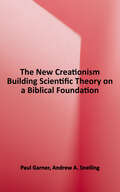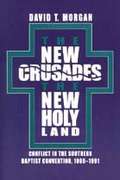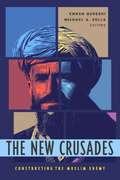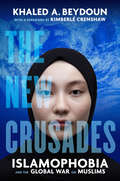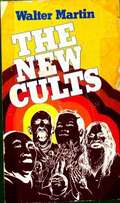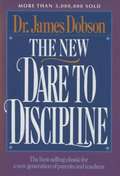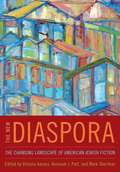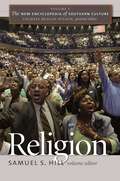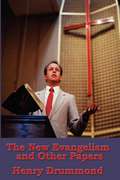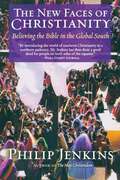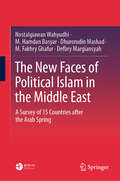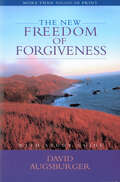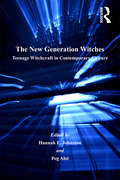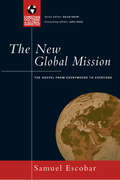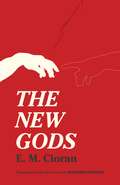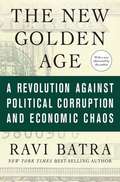- Table View
- List View
The New Civilisation (The Ringing Cedars Series #8, Part #1)
by Vladimir Megré John Woodsworth Leonid Sharashkin"The New Civilisation" is Book 8 Part 1 of The Ringing Cedars Book Series. This series of nine books tells the story of a remarkable woman named Anastasia, discovered in 1995 by a Siberian trader, Vladimir Megré, while he was plying the waters of the remote Ob River. Anastasia was born in the forest in 1969 to parents who died tragically when she was just a baby. Living for the most part without warm clothes, food cultivation or man-made shelter, she has survived on fruit, nuts, berries and mushrooms, brought to her by "wild" animals with which she lives in peaceful harmony. Megré initially spent three days with Anastasia, during which time she displayed such astounding knowledge, power and wisdom that he abandoned his business and, at her request, began writing this series. She told him she would encode the books with an energy that would cause them to sell in the millions. Despite his lack of writing experience, this is exactly what happened. It is Anastasia's ability to strike a chord in the heart of the reader that makes these books so very unusual. The purity and power of her words is provoking an outpouring of joy and hope in people from all walks of life.
The New Cold War?: Religious Nationalism Confronts the Secular State (Comparative Studies in Religion and Society #5)
by Mark JuergensmeyerWill the religious confrontations with secular authorities around the world lead to a new Cold War? Mark Juergensmeyer paints a provocative picture of the new religious revolutionaries altering the political landscape in the Middle East, South Asia, Central Asia, and Eastern Europe. Impassioned Muslim leaders in Egypt, Palestine, and Algeria, political rabbis in Israel, militant Sikhs in India, and triumphant Catholic clergy in Eastern Europe are all players in Juergensmeyer's study of the explosive growth of religious movements that decisively reject Western ideas of secular nationalism.Juergensmeyer revises our notions of religious revolutions. Instead of viewing religious nationalists as wild-eyed, anti-American fanatics, he reveals them as modern activists pursuing a legitimate form of politics. He explores the positive role religion can play in the political life of modern nations, even while acknowledging some religious nationalists' proclivity to violence and disregard of Western notions of human rights. Finally, he situates the growth of religious nationalism in the context of the political malaise of the modern West. Noting that the synthesis of traditional religion and secular nationalism yields a religious version of the modern nation-state, Juergensmeyer claims that such a political entity could conceivably embrace democratic values and human rights.
The New Collegeville Bible Commentary: New Testament (New Collegeville Bible Commentary Series)
by Daniel DurkenConcise and accessible, this one-volume edition of the New Collegeville Bible Commentary: New Testament allows readers to explore any or all of the books with just one resource alongside their Bibles. The individual commentaries collected here are written by respected scholars, and they break open the biblical texts in a lively fashion. <p><p>Readers will be able to engage Scripture more deeply and reflect on its meanings, nuances, and imperatives for living a Christian life in the twenty-first century. Continuing Liturgical Press's long tradition of publishing biblical scholarship and interpretation, this commentary also answers the Second Vatican Council's call to make access to Scripture "open wide to the Christian faithful." <p>Daniel Durken, OSB, is a Benedictine monk and priest of Saint John's Abbey. He taught Scripture and speech classes at Saint John's University for almost five decades and served as director of Liturgical Press from 1978-88. He still writes homily hints and daily reflections for the Loose-Leaf Lectionary and is the founding editor of Abbey Banner, the magazine for the relatives, friends, and oblates of the monastic community.
The New Copernicans: Millennials and the Survival of the Church
by David John Seel Jr."Our millennial children, as well as nonchurchgoing millennials, are both the church's greatest challenge and its most exciting new opportunity."—John Seel, PhDWarning: There is a fundamental frame of reference shift in American society happening right now among young adults. You may think of this group as millennials—those born between 1980 and 2000—but millennials resist this label for good reason: the national narrative on them is pejorative, patronizing, and just plain wrong.Here's what we do know:Of Americans with a church background, 76 percent are described as "religious nones" or unaffiliated—and it's the fastest growing segment of the population.Close to 40 percent of millennials fit this religious profile.Roughly 80 percent of teens in evangelical church high school youth groups will abandon their faith after two years in college.It's unlikely that the evangelical church can survive if it is uniformly rejected by millennials, and yet:Millennial pastors and youth ministers are disempowered; their perspective is often not taken seriously by senior church leadership.Most millennial research is framed in categories rejected by millennials; that is, left-brained, analytical communication is lost on right-brained, intuitive millennials.Evangelicals' bias toward rational left-brained thinking makes the church seem tone-deaf.What's next? Read on. John Seel suggests survival strategies—communication on-ramps for genuine human connection with the next generation. It can be done.
The New Cosmic Story: Inside Our Awakening Universe
by John F. HaughtA Choice Outstanding Academic Title. &“A compelling argument for a broader understanding of religion in relation to our cosmic story.&”—Mary Evelyn Tucker, coauthor of Journey of the Universe Over the past two centuries scientific advances have made it clear that the universe is a story still unfolding. In this thought-provoking book, John F. Haught considers the deeper implications of this discovery. He contends that many others who have written books on life and the universe—including Stephen Hawking, Stephen Jay Gould, and Richard Dawkins—have overlooked a crucial aspect of cosmic history: the drama of life&’s awakening to interiority and religious awareness. Science may illuminate the outside story of the universe, but a full telling of the cosmic story cannot ignore the inside development that interiority represents. Haught addresses two primary questions: what does the arrival of religion tell us about the universe, and what does our understanding of the cosmos as an unfinished drama tell us about religion? The history of religion may be ambiguous and sometimes even barbarous, he asserts, but its role in the story of cosmic emergence and awakening must be taken into account. &“A well written book overall, and one that should prompt a more inspiring view of where we are in the Big Picture, The New Cosmic Story is highly recommended.&”—Forbes.com &“Haught delivers a singular contribution with his fresh, panoptic perspective on our cosmic story.&”—Charles G. Conway, Reading Religion &“This book, John F. Haught&’s summa, will become a permanent contribution to the religion and science literature.&”—Holmes Rolston, III, Templeton Prize winner
The New Creation
by Herbert MccabeThe New Creation explores how human beings can reach real unity with one another and the world around them through the Spirit of Christ. The New Creation engages with themes like the Word of God, the Son of God, the meaning of community and communion and the sacraments as mysteries of human unity; the place of physical healing in the redeemed world and the Old-Testament and pagan religious foundations upon which modern Christianity is built.
The New Creationism: Building Scientific Theories on a Biblical Foundation
by Paul A. GarnerThe academic culture in which science is practiced today is one of tacit - if not explicit - atheism. Nowhere is this more evident than in the scientific study of how the universe began and developed - the field of origins. This book has been written with the conviction that the first eleven chapters of the book of Genesis - the Bible's book of beginnings - provide a trustworthy and accurate account of the universe's early history. In the increasingly secular age in which we live, it is all too easy to forget that the major disciplines of science were founded by men of broadly Christian convictions. Their names are perhaps familiar to us - Boyle, Ray, Hooke, Newton, Faraday - but there is often an embarrassed silence concerning the spiritual beliefs that motivated these scientific giants. Like the astronomer, Kepler, these men perceived that in their scientific insights, they were thinking God's thoughts after him. Today, however, there is a sense of collective amnesia about the religious motivations of these men.
The New Crusades, The New Holy Land: Conflict in the Southern Baptist Convention, 1969-1991
by David T. MorganDavid Morgan captures the essence of the conflict between some modern-day Southern Baptists, who saw themselves as crusaders for truth, as they sought to redeem a new holy land - the Southern Baptist Convention - from the control of other Southern Baptists they viewed as "liberals." To the so-called liberals, the crusaders were "fundamentalists" on a mission, not to reclaim the SBC in the name of theological truth but to gain control and redirect its activities according to their narrow political, social, and theological perspectives. The New Crusades provides a comprehensive history of the conflict, taking the reader through the bitter and divisive struggles of the late 1980s, that culminated in the 1991 emergence of a moderate faction within the SBC. The fundamentalists had won.
The New Crusades: Constructing the Muslim Enemy
by Michael Sells Emran QureshiNot since the Crusades of the Middle Ages has Islam evoked the degree of fear, hostility, and ethnic and religious stereotyping that is evident throughout Western culture today. As conflicts continue to proliferate around the globe, the perception of a colossal, unyielding, and unavoidable struggle between Islam and the West has intensified. These numerous conflicts, both actual and ideological, have revived fears of an ongoing "clash of civilizations"—an intractable and irreconcilable conflict of values between Western cultures and an Islam that is portrayed as hostile and alien. The New Crusades takes head-on the idea of an emergent "Cold War" between Islam and the West. It explores the historical, political, and institutional forces that have raised the specter of a threatening and monolithic Muslim enemy and provides a nuanced critique of much received wisdom on the topic, particularly the "clash of civilizations" theory. Bringing together twelve of the most influential thinkers in Middle Eastern and religious studies—including Edward Said, Roy Mottahedeh, and Fatema Mernissi—this timely collection confronts such depictions of the Arab-Islamic world, showing their inner workings and how they both empower and shield from scrutiny Islamic radicals who operate from similar paradigms of inevitable and absolute conflict.
The New Crusades: Islamophobia and the Global War on Muslims
by Khaled A. Beydoun"The New Crusades is an intersectional milestone. It lucidly illustrates how converging systems of subordination, power, and violence related to Islamophobia are experienced across the globe."—Kimberlé Crenshaw, from the foreword The first book to examine global Islamophobia from a legal and ground-up perspective, from renowned public intellectual Khaled A. Beydoun. Islamophobia has spiraled into a global menace, and democratic and authoritarian regimes alike have deployed it as a strategy to persecute their Muslim populations. With this book, Khaled A. Beydoun details how the American War on Terror has facilitated and intensified the network of anti-Muslim campaigns unfolding across the world. The New Crusades is the first book of its kind, offering a critical and intimate examination of global Islamophobia and its manifestations in Europe, Asia, the Middle East, and regions beyond and in between. Through trenchant analysis and direct testimony from Muslims on the ground, Beydoun interrogates how Islamophobia acts as a unifying global thread of state and social bigotry, instigating both liberal and right-wing hate-mongering. Whether imposed by way of hijab bans in France, state-sponsored hate speech and violence in India, or the network of concentration camps in China, Islamophobia unravels into distinct systems of demonization and oppression across the post-9/11 geopolitical landscape. Lucid and poignant, The New Crusades reveals that Islamophobia is not only a worldwide phenomenon—it stands as one of the world's last bastions of acceptable hate.
The New Dare To Discipline
by James DobsonChildren need love, trust, affection--and discipline. From one generation to the next, the challenge of helping children into responsible adults doesn't change. Dr. Dobson's classic Dare to Discipline, a practical, reassuring guide for caring parents, has sold over 2 million copies since its release in 1970. What gives a book that kind of staying power? The ability to meet a real, felt need in the marketplace. Today, a whole new generation of parents is turning to Dr. Dobson's wise counsel. Some things never change. Tyndale House Publishers and Dr. Dobson are proud to present The New Dare to Discipline, completely updated to meet family needs in the 90's. Spanish available
The New Diaspora: The Changing Landscape of American Jewish Fiction
by Mark Shechner Avinoam J. Patt Victoria AaronsThe Edward Lewis Wallant Award was founded by the family of Dr. Irving and Fran Waltman in 1963 and is supported by the University of Hartford's Maurice Greenberg Center for Judaic Studies. It is given annually to an American writer, preferably early in his or her career, whose fiction is considered significant for American Jews. In The New Diaspora: The Changing Landscape of American Jewish Fiction, editors Victoria Aarons, Avinoam J. Patt, and Mark Shechner, who have all served as judges for the award, present vital, original, and wide-ranging fiction by writers whose work has been considered or selected for the award. The resulting collection highlights the exemplary place of the Wallant Award in Jewish literature. With a mix of stories and novel chapters, The New Diaspora reprints selections of short fiction from such well-known writers as Rebecca Goldstein, Nathan Englander, Jonathan Safran Foer, Dara Horn, Julie Orringer, and Nicole Krauss. The first half of the anthology presents pieces by winners of the Wallant award, focusing on the best work of recent winners. The New Diaspora's second half reflects the evolving landscape of American Jewish fiction over the last fifty years, as many authors working in America are not American by birth, and their fiction has become more experimental in nature. Pieces in this section represent authors with roots all over the world--including Russia (Maxim Shrayer, Nadia Kalman, and Lara Vapnyar), Latvia (David Bezmozgis), South Africa (Tony Eprile), Canada (Robert Majzels), and Israel (Avner Mandelman, who now lives in Canada). This collection offers an expanded canon of Jewish writing in North America and foregrounds a vision of its variety, its uniqueness, its cosmopolitanism, and its evolving perspectives on Jewish life. It celebrates the continuing vitality and fresh visions of contemporary Jewish writing, even as it highlights its debt to history and embrace of collective memory. Readers of contemporary American fiction and Jewish cultural history will find The New Diaspora enlightening and deeply engaging.
The New Encyclopedia of Southern Culture: Religion
by Samuel S. HillEvangelical Protestant groups have dominated religious life in the South since the early nineteenth century. Even as the conservative Protestantism typically associated with the South has risen in social and political prominence throughout the United States in recent decades, however, religious culture in the South itself has grown increasingly diverse. The region has seen a surge of immigration from other parts of the United States as well as from Latin America, Asia, and the Middle East, bringing increased visibility to Catholicism, Islam, and Asian religions in the once solidly Protestant Christian South. In this volume of The New Encyclopedia of Southern Culture, contributors have revised entries from the original Encyclopedia on topics ranging from religious broadcasting to snake handling and added new entries on such topics as Asian religions, Latino religion, New Age religion, Islam, Native American religion, and social activism. With the contributions of more than 60 authorities in the field--including Paul Harvey, Loyal Jones, Wayne Flynt, and Samuel F. Weber--this volume is an accessibly written, up-to-date reference to religious culture in the American South.
The New England Mind: From Colony to Province (Volume II)
by Perry MillerWell documented history of the thought of the time.
The New England Transcendentalists: Life of the Mind and of the Spirit (Perspectives On History Series)
by Ellen HansenAlong with excerpts from widely known writers, the vivid recollections of a girl and of a boy who had been students at Brook Farm School present an enlightening glimpse of the Transcendentalist philosophy. In addition to the essay by contemporary historian, Ellen Hansen, the book includes excerpts from the works of Ralph Waldo Emerson, Henry David Thoreau, Margaret Fuller, Walt Whitman, Octavius Brooks Frothingham, Kate Sloan Gaskill, and Arthur Sumner.
The New Evangelism, and Other Addresses
by Henry Drummond"The question you will naturally ask at the outset is, "What is the new Evangelism?" Now that is a question that I cannot answer. I do not know what the new Evangelism is, and it is because I do not know that I write this paper. I write because I ought to know, and am trying to know. Many here, and all the most earnest minds of our Church, are anxiously asking this question, and each who has once asked it feels it to be one of the chief objects of his life to answer it." Included here are "The New Evangelism: and its Relation to Cardinal Doctrines," "The Method of the New Theology, and some of its Applications," "Survival of the Fittest," "The Third Kingdom," "The Problem of Foreign Missions," "The Contribution of Science to Christianity," and "Spiritual Diagnosis."
The New Faces Of Christianity: Believing The Bible In The Global South
by Philip JenkinsNamed one of the top religion books of 2002 by USA Today, Philip Jenkins' phenomenally successful The Next Christendom permanently changed the way people think about Christianity in Africa, Asia, and Latin America. Now, in this brilliant sequel, Jenkins takes a much closer look at Christianity in the global South, revealing what it is like, and what it means for the future. The faith of the South, Jenkins finds, is first and foremost a Biblical faith. Indeed, many Christians identify powerfully with the world portrayed in the New Testament--an agricultural world very much like their own, marked by famine and plague, poverty and exile. In the global South, as in the biblical world, belief in spirits and witchcraft are commonplace, and in many places--such as Nigeria, Indonesia, and Sudan--Christians are persecuted just as early Christians were. Thus the Bible speaks to them with a vividness and authenticity unavailable to most believers in the industrialized North. More important, Jenkins shows that throughout the global South, believers are reading the Bible with fresh eyes, and coming away with new and sometimes startling interpretations. Some of their conclusions are distinctly fundamentalist, but Jenkins finds an intriguing paradox, for they are also finding ideas in the Bible that are socially liberating, especially with respect to women's rights. Across Africa, Asia, and Latin America, such Christians are social activists in the forefront of a wide range of liberation movements. Anyone interested in the implications of these trends for the major denominations, for Muslim-Christian conflict, and for global politics will find The New Faces of Christianity provocative and incisive--and indispensable.
The New Faces of Political Islam in the Middle East: A Survey of 15 Countries after the Arab Spring
by Nostalgiawan Wahyudhi M. Hamdan Basyar Dhurorudin Mashad M. Fakhry Ghafur Defbry MargiansyahThis book provides a survey of the political situation in 15 Arab countries in the Middle East and North Africa and provides overviews of associated post-Arab Spring politics, with an emphasis of political Islamist movements. A translation from its original in Bahasa Indonesia, the book critically assesses the concept of post-Islamism from an Indonesian perspective. It argues that the wave of democratization in the Middle East following the Arab Spring failed to create an open democratic life in the region, except in the country where the Arab Spring began, Tunisia. Rather, it has left growing conflicts and destabilization in the region, with the rise of new authoritarianism. The authors simultaneously show that Islamic political movements in general are adaptive in the face of the changing political environment post-Arab Spring. They present the example of the Muslim Brotherhood as a movement with distinctive characteristics and high levels of adaptability in changing socio-political environments. It is relevant to advanced undergraduate and graduate students studying and researching contemporary Arab or Islamist movements and to scholars look for a neat comparative survey of countries after the Arab Spring.
The New Freedom of Forgiveness
by David AugsburgerSeventy times seven...how many times shall I forgive? Our Lord answers us clearly that our forgiveness of those who hurt us shall have no end. This is one of the most difficult things any person has to face. David Augsburger understands this. He knows the outrageous cost-and incomparable value-of forgiving. He also knows this is a believer's only option. Any other course of action will not only be destructive, it will violate the will of God. In The New Freedom of Forgiveness, Dr. Augsburger expands upon his classic writing to provide a more comprehensive, expanded, and stronger message. Combining personal testimonies with Scripture, Dr. Augsburger provides readers with practical guidance on applying forgiveness in our everyday lives. With an excellent new study guide, readers will be challenged on an even deeper level. We are commanded to forgive everything. Not just the little stuff, the minor irritations and thoughtless behavior of others, but everything. When we forgive, we are set free from bondage. The New Freedom of Forgiveness is an essential resource not only for understanding what God requires, but also learning how to apply it every day. Read this life-changing book and discover the freedom of forgiveness.
The New Freedom of Forgiveness
by David AugsburgerSeventy times seven...how many times shall I forgive? Our Lord answers us clearly that our forgiveness of those who hurt us shall have no end. This is one of the most difficult things any person has to face. David Augsburger understands this. He knows the outrageous cost-and incomparable value-of forgiving. He also knows this is a believer's only option. Any other course of action will not only be destructive, it will violate the will of God. In The New Freedom of Forgiveness, Dr. Augsburger expands upon his classic writing to provide a more comprehensive, expanded, and stronger message. Combining personal testimonies with Scripture, Dr. Augsburger provides readers with practical guidance on applying forgiveness in our everyday lives. With an excellent new study guide, readers will be challenged on an even deeper level. We are commanded to forgive everything. Not just the little stuff, the minor irritations and thoughtless behavior of others, but everything. When we forgive, we are set free from bondage. The New Freedom of Forgiveness is an essential resource not only for understanding what God requires, but also learning how to apply it every day. Read this life-changing book and discover the freedom of forgiveness.
The New Generation Witches: Teenage Witchcraft in Contemporary Culture (Routledge New Religions)
by Peg AloiFrom the shelves of mainstream bookstores and the pages of teen magazines, to popular films and television series, contemporary culture at the turn of the twenty-first century has been fascinated with teenage identity and the presence of magic and the occult. Alongside this profusion of products and representations, a global network of teenage Witches has emerged on the margins of adult neopagan Witchcraft communities, identifying themselves through various spiritual practices, consumption patterns and lifestyle choices. The New Generation Witches is the first published anthology to investigate the recent rise of the teenage Witchcraft phenomenon in both Britain and North America. Scholars from Theology, Cultural Studies, Sociology, History and Media Studies, along with neopagan commentators outside of the academy, come together to investigate the experiences of thousands of adolescents constructing an enabling, magical identity through a distinctive practice of Witchcraft. The contributors discuss key areas of interest, inspiration and development within the teen Witch communities from the mid 1990s onward, including teenage Witches' magical practices and beliefs, gender politics, the formation and identification of communities, forums and modes of expression, media representation and new media outlets. Demonstrating the diversification and expansion of neopaganism in the twenty-first century, this anthology makes an exciting contribution to the field of Neopagan Studies and contemporary youth cultures.
The New Global Mission: The Gospel from Everywhere to Everyone (Christian Doctrine In Global Perspective Ser.)
by Samuel EscobarChristian mission is no longer a matter of missionaries from the West going to the rest of the world. Rather, the growth of Christianity in Latin America, Africa and parts of Asia is eclipsing that of the Western church. In the third millennium of the Christian era, Christian mission is truly global, with missionaries from all places going to all peoples. Veteran missiologist Samuel Escobar presents this introduction to Christian mission today. He explores the new realities of our globalized world and assesses the context of a changing mission field that is simultaneously secular and syncretistic. He also sets forth a thoroughly biblical theology of missions, considering how God the Father, Son and Holy Spirit are at work around the world, with implications for how Christians are to go about the task of global mission.
The New Gods
by E. M. CioranDubbed OC Nietzsche without his hammerOCO by literary critic James Wood, the Romanian philosopher E. M. Cioran is known as much for his profound pessimism and fatalistic approach as for the lyrical, raging prose with which he communicates them. Unlike many of his other works, such as "On the Heights of Despair" and "Tears and Saints," "The New Gods" eschews his usual aphoristic approach in favor of more extensive and analytic essays. aReturning to many of CioranOCOs favorite themes, "The New Gods "explores humanityOCOs attachment to gods, death, fear, and infirmity, in essays that vary widely in form and approach. In OC PaleontologyOCO Cioran describes a visit to a museum, finding the relatively pedestrian destination rife with decay, death, and human weakness. In another chapter, Cioran explores suicide in shorter, impressionistic bursts, while OC The DemiurgeOCO is a shambolic exploration of manOCOs relationship with good, evil, and God. All the while, "The New Gods "reaffirms CioranOCOs belief in OC lucid despair, OCO and his own signature mixture of pessimism and skepticism in language that never fails to be a pleasure. Perhaps his prose itself is an argument against CioranOCOs near-nihilism: there is beauty in his books. "
The New Golden Age: The Coming Revolution against Political Corruption and Economic Chaos
by Ravi BatraBringing his signature insight and expertise, the controversial economist Ravi Batra takes on a host of problems facing the world economy, including the oil and housing bubbles, falling minimum wages, corporate scandals and gross ethical lapses.
